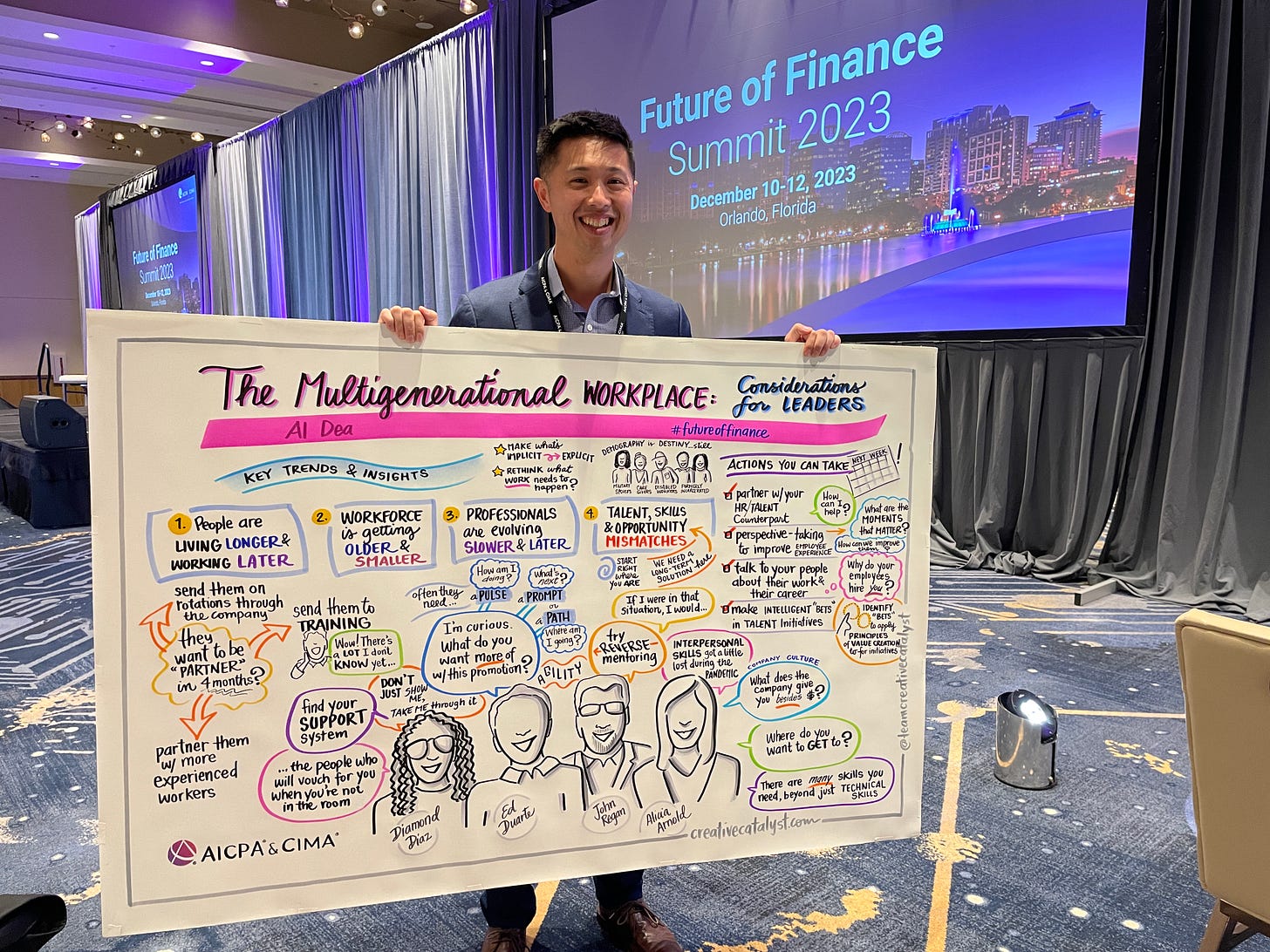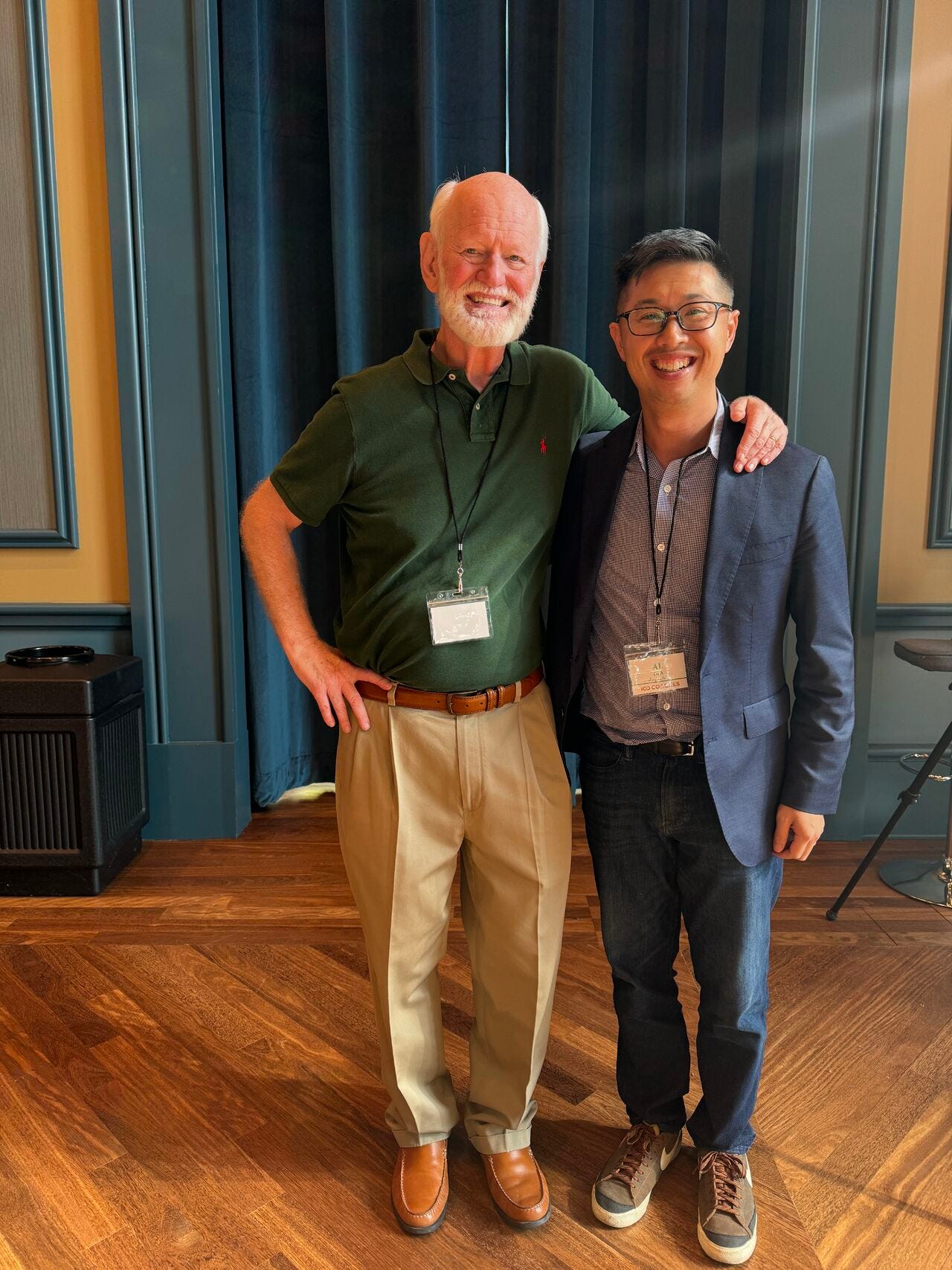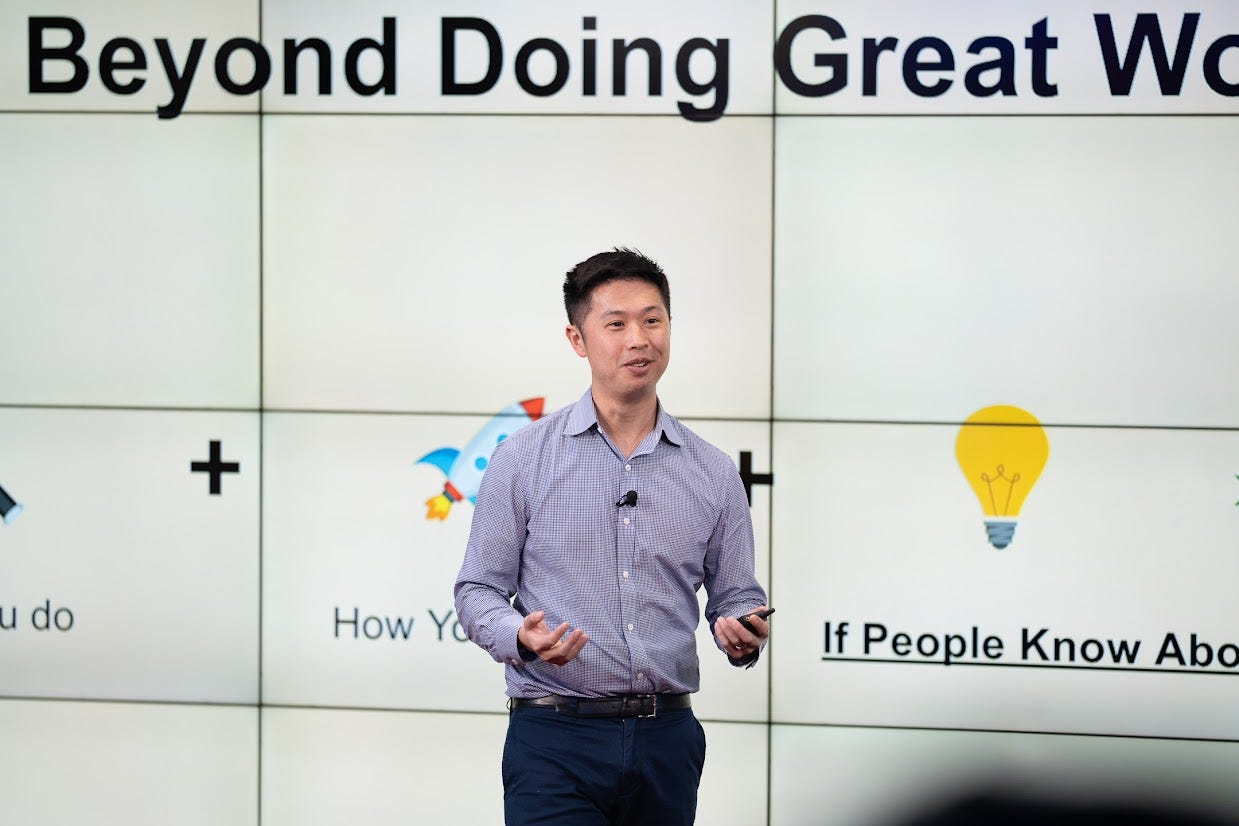Celebrating 3 Years of My Entrepreneurship Journey
Stories, learnings and notes from 3 year of running my own business
Heads Up: This is a long read. This post is about celebrating my 3rd year of entrepreneurship and the learnings along the way. If this is too long for you to read, you can skip it and check out this podcast episode I did recently on Speaking Up and Leadership with Nicole Gwanzura.
Celebrating 3 Years of My Entrepreneurship Journey
This week is the 3rd anniversary of starting my leadership development consulting firm and fully embracing full-time entrepreneurship. I’ve written about my journey to this in past editions (like this one), but the short story is that after a decade and a half of working in corporate institutions and 5.5 years of running a side hustle as a trainer and speaker, in 2021, I decided to leave the corporate path to pursue running my own leadership development consulting business.
Three years later, I’m happy to report that I’m still going, still standing, and excited about what the next year has to come. Each year has been better than the last, and despite some challenging economic headwinds, I’m continuing to grow the business in a tough climate.
As a naturally reflective person, I wanted to take some time to reflect on some of my learnings from the past year and to share some of my experiences and insights.
Year 3 Highlights
Process, Patterns and Predictability
Some of you might be reading that and thinking that sounds boring! You wouldn’t be wrong, but in the context of being an entrepreneur, these are helpful, especially in the early days. This year, I've noticed more grounding in the process and patterns of my business. The first two years were more chaotic, but now I can see seasonality and client patterns that allow for better planning. I've developed some marketing, business development, and relationship-building processes, providing confidence that business will continue in the months ahead. These "guardrails" help me prioritize actions and maintain momentum.
Generating Your Own Offense is a Great Skill
In basketball, some of the best players “generate their own offense.” These players are uniquely skilled in creating opportunities for themselves to score points or positvely impact the game, without much help from their teammates, which makes them incredibly valuable. This skill, I’m learning, is incredibly valuable for entrepreneurs.
While it’s true that it’s hard to succeed without the help of others and perhaps some luck and fate, being able to “generate your own offense” ensures that you can create your own momentum toward your goals and aspirations and manufacture your serendipity.
One of the things about working in big corporations was that, in my mind, there were opportunities everywhere. Once you learn how to navigate the system and build relationships, you could create many opportunities for yourself. It was one of the reasons why it was so hard for me at times to leave big corporations; I just felt like there was an endless stream of opportunities (until there wasn’t.) When you work for yourself, you don’t have a system or culture (nor thousands of people) that enables that, so you must find ways to do that on your own.
Writing this newsletter is a great example. One of my past editions was passed around internally at a company which led to them reaching out to me asking if they could republish this on their blog. That led to their team contacting me to form a partnership related to their virtual and in-person events.
Another example came from sharing some of the most exciting things I found on LinkedIn in a weekly roundup post. People started liking those posts, and over time, it has allowed me to connect with others who have become essential in my professional network and made introductions to new clients. I will gladly take serendipitous opportunities and stumbling into luck, but learning how to generate my own offense has allowed me to carve off a small part of influence in the serendipity creation process that has brough me opportunities I couldn’t necessarily see.
Deliberate Actions Compound Over Time
There’s a famous proverb that says: “When’s the best time to plant a tree? 20 years ago. The second best time? Today.” The idea behind the proverb focuses on the criticality of getting started not just for today, but what could be in the future. Some of my best opportunities, be it client work, new partnerships, business relationships, etc., from this year, came out of actions I intentionally took as far back as a decade ago - with starting MBASchooled, deciding to share on LinkedIn, being open to speaking at local events and with colleges and universities, and so many more.
This is both exciting and humbling. Exciting in that the deliberate actions you choose to take today can and might lead to outcomes and opportunities you want at some point down the road. Challenging in that you don’t know when something will hit, or for that matter, if it will hit.
In the simplest form, your beliefs/values guide your actions, which over time, lead to outcomes. My mental model for how I think about my business in the most foundational form is around how I take the actions today that I know will lead me to the outcomes that I want tomorrow. It won’t always be perfect, it won’t always work out, but over time, I think it does.
The Liminal Space between Theory and Practice
If you read books or follow frameworks around entrepreneurship, you will hear things like “niche down,” “solve customer pain points,” or “develop a unique selling proposition.” On the surface, all of these are generally excellent and positive theories that a business owner could pick up a book or podcast on and say they would want to do.
Often, there is a dichotomy between theory and research and practicality and reality. I think the learning is that these theories are meant to be explored, not followed or defined.
Choosing a niche is a perfect example. While it is true that many people become successful because they focus on a particular niche, what you don’t realize until you do the work is that for many, it’s less of “choosing” and more of falling into it. That only happens when you go through the exploration and process of trying to choose one and realizing that it’s either hard to choose, you picked the wrong one, or it’s sort of unclear if you have a niche or not.
These are uncomfortable realizations, a lot of times because it feels challenging to shoot for a goal, not achieve it, and feel like you are in lost. Your natural reaction is to “work harder” or “define it better” or just keep pushing forward, when in reality, what you probably need to do, is to take a deep breath, enjoy that liminal space, open your eyes, and explore it.
Learnings
Entrepreneurship is full of lessons and learnings. Here are a few that come to mind from this year.
You have the power of choice and choice is hard.
One of the great things about being an entrepreneur is that you can exercise choice and autonomy. You can choose the type of work, type of clients, when you want to work, etc. But while having the choice is excellent, it can also be challenging. What happens when there are lots of great choices? What about hard ones? What about living with the consequences of your options? This is not me asking for a pity party, but more of realization and appreciation for people who are comfortable and confident in making choices and decisions regularly.
Knowing when to keep going or to pivot
In my old job in corporate, if something wasn’t working or if I wasn’t doing something I was supposed to be doing, I knew. I knew because someone yelled at me at some point, and I knew that I needed to correct the course. As an entrepreneur, you don’t always get that feedback loop. Should I launch this new initiative? Should I invest in Project A or Project B? It’s hard to know for sure, so the only way to find out is to do it. But once you launch, how do you know if it will work? And, if it’s not working, how do you know when you should pull the plug? Or should you give it more time because you don’t want to kill the project too soon? But if you wait too long it could hamstring you!
There’s always more if you don’t know what is enough.
There is always another achievement, milestone, goal, or level to shoot and aim for. As humans, we’re wired to hunt for more. And while that can be great, it can also be dangerous or exhausting. Achievement without intention can lead to a lot of success and equal amounts of unhappiness. At a minimum, high levels of achievement without regard for goals can negatively impact other aspects of your life. This is not to criticize ambition (super important) or striving (also a good thing) but rather to focus on achieving or striving for what is enough and not just what is more. There will always be more unless you define what enough means to you. I saw this when I worked in large companies and looked around to see what other people above me were working for and towards. This is not a criticism of their ambitions and mindset; it dawned on me that “more” of what they were working for was not going to make me believe I was going to be happy or fulfilled with that life, which pushed me to think deeply about what would.
Realizing a working definition of enough at the time gave me the confidence to leave the corporate environment to pursue my version of enough. With that said, in this season of my life and business, I’m faced with wondering what enough is because as I have evolved, so too has my definition of enough. I don’t have an easy answer other than constant reflection and paying attention to your goals and intentions.
Highs
Keynote Speaking
For almost 15+ years, I attended conferences that my dad put on as a kid. I saw incredible business leaders of the industry giving keynote speeches on stage. I wondered what it would take to do that one day and if I would ever have what it took for that to become my profession. I’m privileged that I get to experience a slice of that.
I’m not a full-time keynote speaker; it is a healthy and formidable part of my business and one that I really enjoy. Getting on stage to share my knowledge with others and inspire them to take action is a dream I have to live out, and I am grateful for that. Every time I have a chance to speak, I try to find a few moments of quiet before going on stage to sit silently with myself and to let it sink in, and remember the teenager who was once stacking chairs in convention halls and putting handouts of slides on seats for attendees. It’s a humbling but enriching experience to see how far I’ve come to appreciate the journey to getting there and to remember all the people who opened doors for me along the way. (Speaking of which, if you are looking for a keynote speaker for your conference, hit me up!)
Making a Difference in My Profession
3 years ago, I started going to my industry/professional conference. I didn’t know very many people and I wasn’t sure how to navigate around. This year, I spoke at the conference and had many things to do and many people to connect with. In a short three years, I was able to make an impact and cultivate relationships that have helped me personally and professionally but also to make a small dent in positively contributing to the profession.
One of my more humbling moments came near the end of the conference when I ran into someone in real life who I had connected with digitally with just to get to know each other. When we chatted in person, they gave me some really meaningful compliments and encouraged me to keep up the great work. Their quote: “I see what you are doing, it’s make a difference and we need more of it.” This individual has been in the industry for over 25 years and is seen as a leader and someone that people respect, so getting that kind of compliment from someone who is a well-respected person in the industry was very humbling and meaningful.
Writing
As much as I love podcasting and other medium formats, I still really enjoy writing and taking what I see, observe, and research and trying to turn it into insights and ideas that help people think and work differently. Writing helps me clarify my ideas and practice translating self-reflection into action, allowing me to pressure test my ideas when I share it with others. Between this newsletter and other formats, I’ve probably written close to 100,000 words this year about talent, leadership, and the workplace. While not all of them make this newsletter or other places, these are the deliberate reps I’m getting further to solidify my confidence in my ideas and expertise and develop new ideas and expertise. As a service-based entrepreneur, I don’t have products, so the quality of my ideas really matters. Writing helps ensure that I have quality ideas.
Lows
Losing Clients
Over the past year, I’ve lost clients for several reasons. While some of these are necessary, and others are out of my control, there is always a moment of dread and despair. I chalk it up to mostly being a survival mechanism, but in almost all cases, after it’s happened and when I’ve taken the time to reflect and think about it more strategically, it is easier to see that while you can be disappointed, it’s probably better to learn what you can from it, move on and then use that time to go find clients who are excited to work with you on the thing you want to work on.
Ghosting
When I got married, I thought the concept of ghosting would be over, but it turns out it's just the beginning. I’ve had a number of opportunities get off to a great start, only for the organization to silent for months and then to resurface and pull back, or in some cases, just not respond. This is not a fun feeling, especially when you see the potential in working together, and it’s even more frustrating when you deprioritize other opportunities around something like this, and then it happens. At the end of the day, you can’t do business with people who don’t want to do business with you (the reasons for it ultimately don’t matter), so you just have to decide whether you want it to annoy you or if you want to let it go.
Navigating Procurement, Contracts, and Lawyers
Being an entrepreneur is still a job, and like any job, there are highs and lows. One of the harder parts of being a small business that serves more giant corporations is navigating the complexities and processes that sometimes exist with organizations. If I was a large business, I would have a team that could handle some of these things, but since it’s just me, I’m on my own. These are sometimes chalked up to the cost of doing business, but at times they can truthfully feel draining and frustrating. In some cases, they can also seriously impact your business regarding risk, cash flow, and strategy. The most notable being procurement and legal. I’ve made progress in putting in protections and investments to help mitigate these challenges, but they are very real and not a lot of fun to manage.
Questions For Reflection
As I enter the 4th year of my business, here are some questions I am reflecting on:
What do I need to stop doing and working on?
To continue learning as an entrepreneur, who are the people 5-10 years ahead of me I need to continue to spend time with and learn from?
What would I have to do and not do if I wanted to 10x my business?
How do I align my actions to the outcomes (and measure it?)
What is enough?
Given this stage of my life, how do I set time limits on my work and prioritize within the constraints?
Conclusion
Each day, I’m grateful that I get to call this my job and profession. As I head to year four, I’m going to continue to trust actions that I think will lead to the outcomes that I want and sticking to them.
It will also focus on being much more intentional with my time each week, prioritizing the most critical relationships/partnerships needed to continue growing the business, and trying my best to channel my creativity/generative nature into a small number of things. I’m proud of my accomplishments over the last few years and excited about what’s ahead.
If you’re looking for some help for your learning and development, leadership development or professional development for this year, I’d love to work with you: Here is how I might be able to assist:
Leadership & Learning Programs: Formal training and leadership development in your company, such as new manager or new leader training, or skill-based programs.
Consulting & Advisory Services - Are you looking to improve the ways of working of your team or organization or looking for guidance on talent and learning strategy? Let’s chat about how we can work together
1:1 Executive Coaching - Are you looking for an executive coach for 1:1 leadership support? Let’s chat about how we can work together
Feel free to contact me directly for more details!
Have a great week!
Al







Congrats on the milestone and thanks for taking the time to reflect, and share. As someone that recently returned to the Bay Area and is searching for what's next professionally, Creating Your Own Offense resonated.
I also love your bit on "enough". It's especially important in our society when the default is more.
Hi Al! CONGRATS on your 3-year milestone and thank you so much for sharing your journey. Having worked in corporate and at start-ups, a lot of your reflections resonated with me. I loved the "Deliberate Actions Compound Over Time" section, specifically reminding us to take action and being international to start today because our actions compound over time.
I believe entrepreneurship is the ultimate form of personal and leadership development and your journey inspires others, like me, to pursue our dreams and start now. Rooting for you and excited to witness the amazing things you'll do.
(Btw, we met 5 years ago while I was a MBA student at Berkeley and you were a speaker at a Salesforce virtual event.)